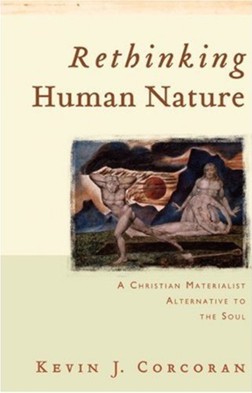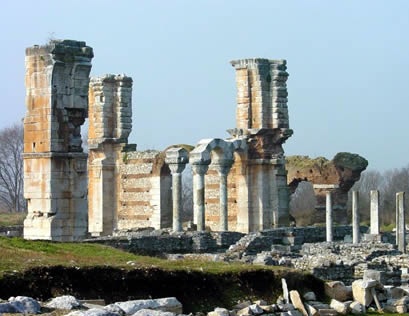
We began last Thursday to look at Kevin Corcoran’s book Rethinking Human Nature: A Christian Materialist Alternative to the Soul where he develops a constitution view of human persons. Professor Corcoran
is a philosopher teaching at Calvin College specializing in philosophy
of mind, metaphysics, and philosophy of religion – a philosopher who
tries to connect philosophy with bible, theology, faith, and science. Reading this book is something of a new experience for me as I have taken one and only one philosophy course – some many years ago as a freshman in college. Formal philosophy is not, and never has been, high on my list for leisure reading. But this book is interesting.
Today’s post will consider a few points from Chapters 1 and 2, the dualist and nothing-but materialist views of human persons. The key question is that introduced in the last post – what is the essence of a human person? What relationship does this essence have to our physical bodies?
Dualism is pretty clear – at least in the common view. Human persons
consist of separable parts – body and soul. Corcoran introduces three
varieties of dualism and discusses arguments for and against each.
The nothing-but materialist view is also relatively clear – metaphysical naturalism claims that there is nothing but the natural world and thus we must be defined by our bodies. We are not defined by the precise matter of composition, neither are we defined merely as animals – organisms. But we are defined by some natural feature of a living body.
This whole discussion leads to the significance of consciousness as we consider the essence of a human person – the capacity for consciousness.
Corcoran suggests that consciousness is a problem for nothing-but materialism, but no less so for dualism. Consciousness does not prove that we possess an immaterial soul.
This leads to the questions for discussion today.
Does the capacity for consciousness define the essence of a human person?
Is consciousness an argument for the existence of God? Is it something that cannot be explained by natural mechanism alone?
I struggled with this post – there are a dozen discussions I would like to start (perhaps some of them will come up again in later posts). It was hard to choose a focus for this post. But I am a scientist, and as such the role of science and naturalism in the way we think about the world around us is a problem that constantly confronts – as a result I am going to pick up on this point in Corcoran’s book.
Consciousness is an unsolved problem. We have no clue what creates consciousness – in humans, or in animals, for who would suggest that cats and dogs, for example, have no consciousness. (Just watch the video on a soldier and his dog in Weekly Meanderings and try to claim the absence of consciousness.) It is clear however, that consciousness is intimately connected to the brain and to the physical structures of the brain.
In the scientific community there is an assumption that there must be a natural explanation for consciousness – we may never know the explanation, our brains may be constitutionally incapable of discovering it – but it must exist. The metaphysical naturalism of many absolutely requires a natural explanation, for nothing else exists.
Is this the perfect place for to look for proof of God?
Corcoran here has a discussion that I find particularly good – worthy of consideration, so I will quote at length.
And I think what McGinn means by “resolutely shunning the supernatural” is to rule out a priori, the existence of God, the soul, or anything supernatural or immaterial. To put it another way, McGinn is a metaphysical naturalist (a naturalist about everything: the natural world is all there is, so it is exhaustive of reality). But one need not embrace that thoroughly secular claim in order to believe that is is in virtue of some natural property of brains that organisms are conscious.
For example, I am a theist, a supernaturalist, you might say. As such, I believe in God the Father almighty, maker of heaven and earth. And since I believe in the God of the Christian Scripture, I believe neither that the natural world is all there is nor that the natural world is “casually closed.” I believe, in other words, that God can intervene in the natural world, that God has done so, and that God continues to do so. Nevertheless, I believe that, for the most part, God does not directly intervene in the natural world. Since the natural world has yielded in so many ways to scientific explanation over the past several hundred years, it seems only plausible to believe that God created the world – the natural world – with its own integrity, such that is operates according to regularities that can be grasped and understood not only by those who acknowledge its author but also by those who do not and whose explanations, though accurate, do not appeal to the author of nature. …
Since God created the natural world and all that it contains with its own integrity, it is also reasonable to believe that consciousness itself – a feature encountered in the natural world – has a natural explanation. In other words, we can accept McGinn’s assertion that it is in virtue of a natural property of the brain that organisms are conscious without accepting his metaphysical naturalism. (pp. 59-60)
Corcoran suggest that we should take a view of chastened naturalism. Chastened naturalism accepts a natural view but refuses to take it all the way. Granting that consciousness is a natural property of organisms is not capitulation and does not require the sacrifice of Christian commitments. Consciousness may some day yield to natural explanation and the Christian faith will emerge unscathed.
Back to the topic of consideration – Corcoran finds the identification of human persons with an immaterial soul or a material body unconvincing. I agree – dualist views that divorce thought and consciousness from our physical being are unconvincing – both scientifically and philosophically. Research on the brain demonstrates a deep connectedness between our consciousness and the essence of what makes us human persons and our material bodies. Consider, for example, studies that show that interfering with signals in a
specific part of the brain can turn off a natural tendency to see
ourselves positively, glossing over negative characteristics. Don’t these kinds of studies prove that mind and brain are not separable? That, despite what Descartes claimed, the part of me that thinks is identical, at least in this life, to the body?
But perhaps you disagree.
Is consciousness a problem for materialism and an indication of the dual nature of human persons as body and soul?
If you wish to contact me, you may do so at rjs4mail[at]att.net

